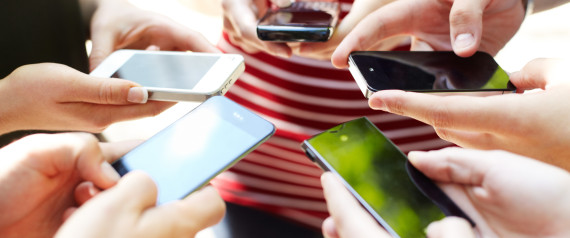
Are you attached to your digital devices? If the thought of being disconnected makes you sweat, you're not alone. Americans are spending more time than ever with their screens[1] , logging an average of more than five hours per day.
So how do you curb your addiction? Whether you're addicted to Facebook ("That status only got eight likes?!") or you can't stop scrolling during dinner ("Did you see Kim Kardashian's tweet?") there comes a time when you need to take a smartphone sabbatical. Below find the 19 telltale signs you need to unplug.
1. You're experiencing blurred vision.
Are your eyes fading out on you? It may be more than a natural regression -- you could be doing it to yourself. According to a 2011 study[2] , all the squinting we do at our screens is taking a serious toll on our eyes. Approximately 90 percent of people who stare at digital devices for more than two hours per day experience complex eye problems, including blurred vision and dry eyes.
2. Phone panic is a very real thing.
Whether it's doing the frantic purse fumble when your phone is not in its right pocket or just forgetting it altogether, you've experienced the heart-stopping horror of what it's like without your device -- and it's not pretty. The thought of being disconnected for an extended period of time would cause 73 percent of Americans to feel panicked, according to a 2012 study[3] .
3. You're working after hours.
If you find yourself checking emails after dinner or at your cousin's wedding, it might be time for a little digital detox. According to a 2012 survey conducted by Good Technology[4] , approximately 80 percent of Americans admit working beyond their normal hours. And if you think you're just sending a quick email or taking phone call here and there, think again. In the end, workers spend an average of seven hours per week doing work outside of the office -- almost a full extra workday.
4. You have a pounding headache.
In addition to causing eye strain, too much screen use can also result in headaches[5] and fatigue. And that's not the only effect our digital device has on our brains. According to one study, smartphones may even be causing "digital dementia[6] ," which creates cognitive issues and short-term memory loss.
5. You have no idea how to get to basic places without Google maps.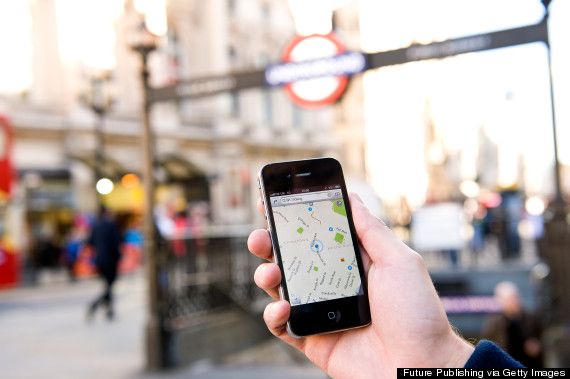
6. Your sleep is suffering.
If your device has a spot next to you on the pillow, you may want to re-think your phone habits -- it could be sabotaging your sleep. Studies[7] have found that prolonged exposure to cell phones right before bed makes it harder for users to fall asleep and creates a fitful night's rest. Not to mention there's always the temptation of checking your notifications right before you shut your eyes. If you're having trouble getting your recommended amount of sleep, try disconnecting from your phone before you settle down for the night.
7. You hear phantom vibrations.
If you've felt your phone vibrate, only to reach for it and discover that it wasn't, you aren't alone. In fact, the sensation so common, it started gaining attention from the medical community. In a 2012 study published in Computers of Human Behavior[8] , researchers found that Phantom Vibration Syndrome is a phenomenon experienced by a large portion of young adults approximately once every two weeks. The study also suggested that those who were bothered by it showed symptoms of text-message dependency -- a sign that it may be time to unplug.
8. "LOL" and "hashtag" are part of your vocabulary.
Have fun weekend plans? Hashtag excitement. If you really say hashtag, LOL, BRB or any other internet-lingo in actual conversation, it might be time to put down the phone.
9. Your hand looks like this.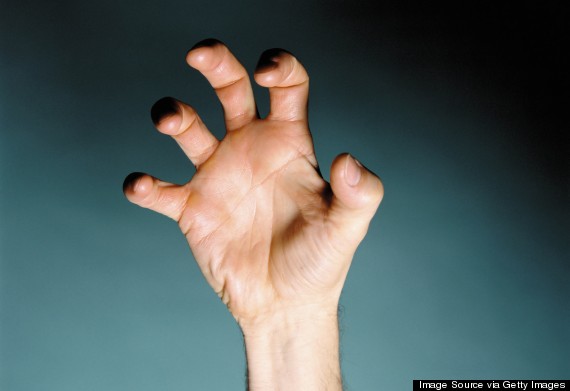
While text claw[9] isn't a medical diagnosis, the position of a smartphone can cause cramping and soreness in the hands and fingers. If you find that you need to do some stretching after logging some time with your phone, it might be time to disconnect.
10. You text someone when they're in the other room (or right next to you).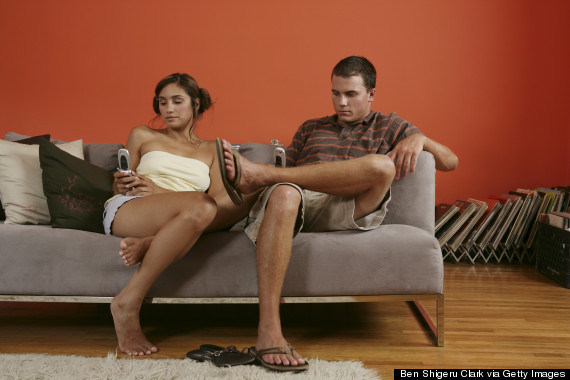
11. When you go into the bathroom, so does your phone.
If you take your phone with you everywhere -- including the bathroom or the bedroom -- it might be time for a little digital intervention. According to a recent HuffPost/Yougov survey[10] , approximately half of smartphone users ages 18 to 29 bring their phones into the bathroom stall. A study [11] commissioned by smartphone-maker LG Electronics also found that 77 percent of Americans would use their smartphones while they're in bed with someone else.
12. You're Instagramming your food more than eating it.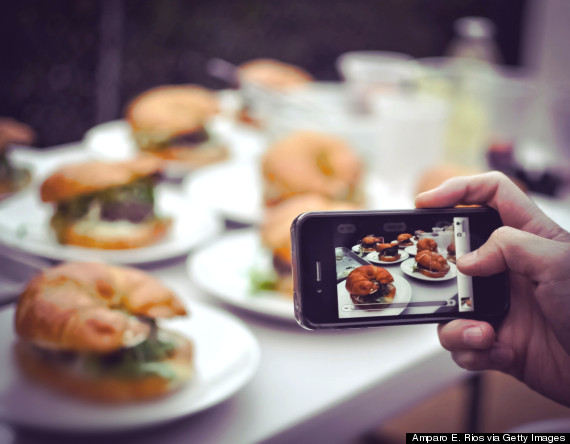
Currently there are more than 5 million photos tagged of food on Instagram -- and that time you spend sharing your meal with your social network instead of who's in front of you may be hurting your relationships. Studies conducted by the University of Essex[12] found that if a phone is visible during a conversation in a close setting it causes people to feel less-positive toward the people they're chatting with.
13. You've forgotten how to maintain eye contact.
Human-to-human eye contact is decreasing, and our technology may be to blame[13] . According to communications analytics company Quantified Impressions[14] , adults make eye contact between 30 to 60 percent of the time during a regular conversation. That number may sound decent, but in order to establish an emotional connection, eye contact must be made during 60 to 70 percent of the communication. If you find yourself feeling the need to look down at your phone during an interaction with someone else, it's time to ditch the device for a little while.
14. You haven't talked to someone in three months, but you know all the news thanks to your social networks.
15. You find yourself thinking in 140 characters.
Admit it: One of the first things you thought about when you landed that job was how you're going to share it on Facebook. And when you awkwardly found yourself sitting next to a couple arguing on the train, you had tweet about it. Oversharing[15] is a frequent issue on social media -- and it can have a negative impact on your relationships, so think twice before you post.
16. The last phone number you memorized was 10 years ago.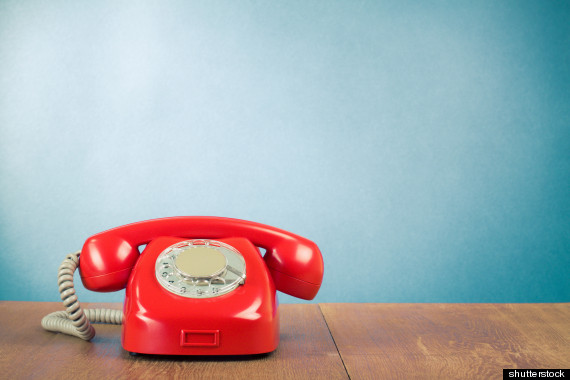
17. You have poor posture.
That shoulder slump you're feeling could be because of your smartphone habits. When we type on our devices, our bodies automatically lead forward, causing strain on our necks and backs, according to orthopedic surgeon Dr. Alton Barron[16] . The muscles in our bodies accommodate for our natural position, causing pain and posture problems.
18. You lose awareness of your surroundings.
Research[17] shows that it's nearly impossible for the human brain to multitask -- and texting while trying to do something else is no exception. If you're in a frequent habit of texting and driving (which is banned[18] in some states), texting and working or even texting and walking, it's time to take a break and focus on one thing at a time.
19. You feel the need to document (or selfie) every occasion.
Enough said.
Also on HuffPost:
References
- ^ more time than ever with their screens (www.huffingtonpost.com)
- ^ 2011 study (www.ncbi.nlm.nih.gov)
- ^ 2012 study (www.huffingtonpost.com)
- ^ 2012 survey conducted by Good Technology (www.huffingtonpost.com)
- ^ headaches (www.huffingtonpost.com)
- ^ digital dementia (www.foxnews.com)
- ^ Studies (www.huffingtonpost.com)
- ^ 2012 study published in Computers of Human Behavior (www.sciencedirect.com)
- ^ text claw (www.huffingtonpost.com)
- ^ HuffPost/Yougov survey (www.huffingtonpost.com)
- ^ study (www.huffingtonpost.com)
- ^ conducted by the University of Essex (www.scientificamerican.com)
- ^ technology may be to blame (www.huffingtonpost.com)
- ^ Quantified Impressions (online.wsj.com)
- ^ Oversharing (www.news.ku.edu)
- ^ according to orthopedic surgeon Dr. Alton Barron (www.huffingtonpost.com)
- ^ Research (www.huffingtonpost.com)
- ^ banned (www.huffingtonpost.com)
- ^ Send us a tip (www.huffingtonpost.com)
- ^ Send us a photo or video (www.huffingtonpost.com)
- ^ Suggest a correction (www.huffingtonpost.com)

0 comments:
Post a Comment
Click to see the code!
To insert emoticon you must added at least one space before the code.